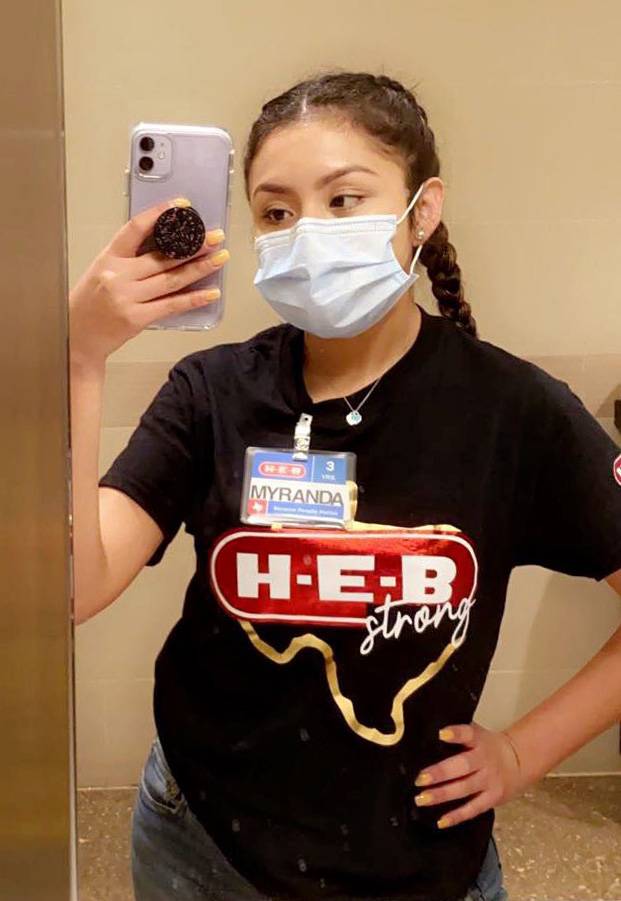Being an essential worker and a college student
Yvonne Rhodes | April 13, 2020

Millions of Americans have changed their daily routines to comply with Shelter-In-Place orders and slow the spread of coronavirus. Even as countless businesses, parks, churches, and schools have closed, it takes a vast network of essential workers to continue operating arguably the most essential service of all – grocery stores.
Myranda Nichole De La O, a Texas State University student from San Antonio, is one such essential worker. She’s a cashier at HEB in San Marcos, juggling busy shifts at the grocery store with her class schedule, which moved to remote instruction to promote physical distancing on the university campuses. In response to the pandemic, her hours at the grocery store have almost doubled.
We caught up with Myranda to find out what it’s like to be both an essential worker and Texas State student during this unprecedented time.
Q: How has it been switching to online classes?
Myranda Nichole De La O: Making the switch to online classes has been a bit difficult because I have been working so much. The numerous emails I would get from professors while at work would be a reminder.
Some cons of switching to online learning is that I will no longer be able to interact with the schoolchildren. I was at Bonham Preschool for my early childhood education classes, and I loved seeing and working with the kids. I’m really sad I won’t be able to see them anymore.
Q: Any advice for your fellow students on balancing a lot at one time?
MND: Try to take things one day at a time. Don’t overwhelm yourself.
Q: Favorite class or professor that has done a particularly good job at the online transition?
MND: I love my ECE block professor, Becca Hemenway, because she sends detailed emails so we’re clear on what’s going on. She also personally checks in with each of us to make sure we’re okay, and if we need anything from her. (ECE block is a set of two courses focused on Early Childhood Education practice and theory. It requires students spend a minimum of 30 hours of internship in early childhood settings with young children and practicing ECE teachers)

Q: Any advice for grocery shoppers?
MND: Some advice I’d like to give to shoppers is to not take out frustration or anger on employees. The food and supply shortages are not our fault, and the purchasing limits are not our fault. We expose ourselves to the virus daily so shoppers can get their necessities. Not to mention, we’re exposing our families to the virus, as we go home to them after work. When we ask shoppers to stand on the red box and wait behind the shield, it’s not to boss them around. We’re asking to keep them and us safe.
Q: What does it mean to you to be a Bobcat?
MND: To me, being a Bobcat means everything. I feel very lucky to be a part of so many traditions. Being on Strutters for 3 years is what really made my time here at Texas State worthwhile.
TXST students: We want to hear from you. How has the pandemic impacted your life, studies, work and goals? Email yp1005@txstate.edu.
Share this article
For more information, contact University Communications:Jayme Blaschke, 512-245-2555 Sandy Pantlik, 512-245-2922 |